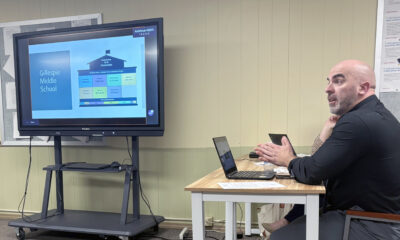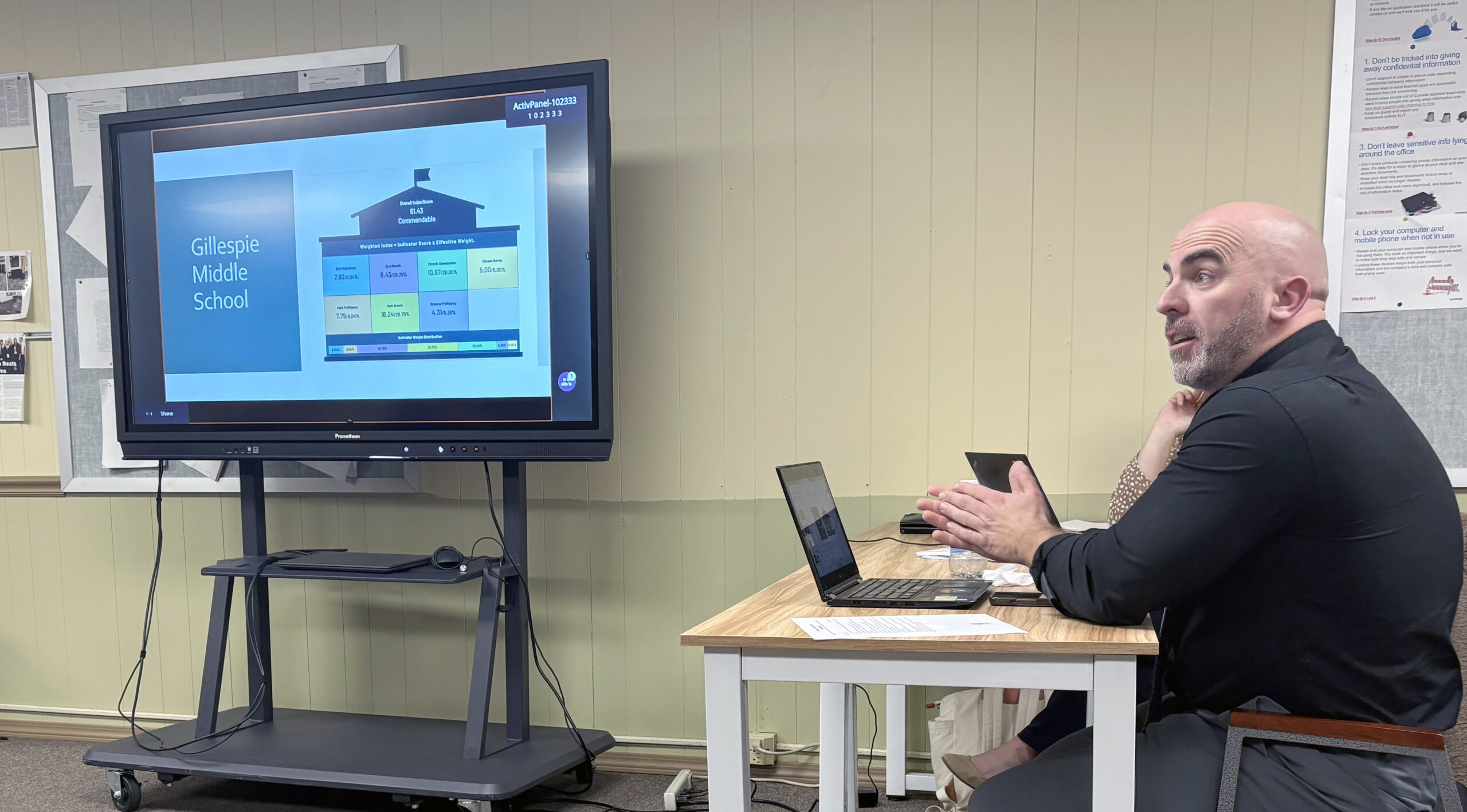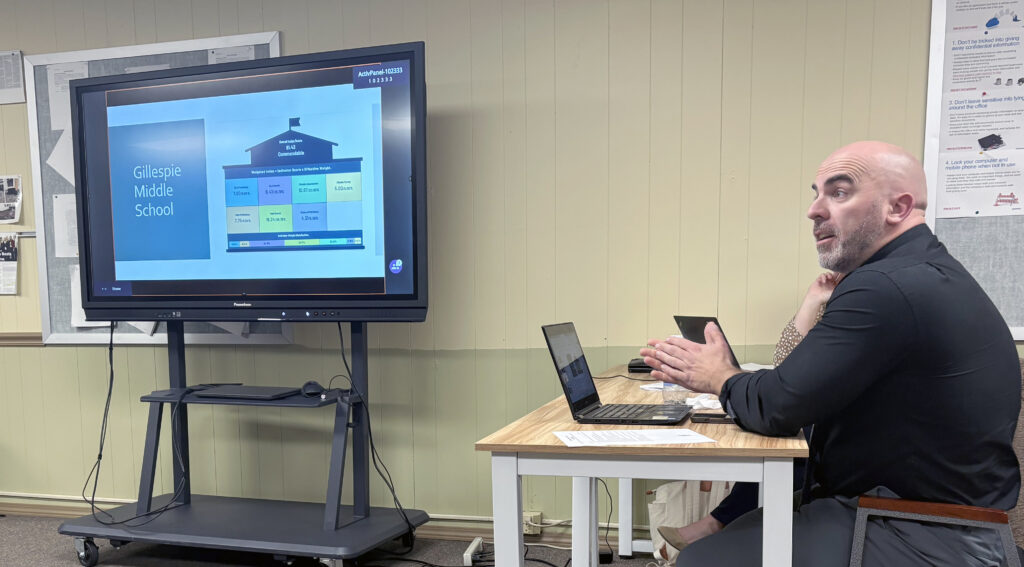Community News
CUSD 7 School Board approves $15.9 million budget, approves resolution to use e-learning in lieu of snow days
Published
5 years agoon
By
Dave A

A budget approved by the Community Unit School District 7 Board of Education on Monday night calls for more than $755,000 in deficit spending largely due to the effects of the COVID-19 pandemic on both expenditures and revenue for the current fiscal year. The board approved the budget on a motion by Jenni Alepra following a public hearing required by law during which Supt. Shane Owsley discussed the details of the budget document.
In other action, the board also unanimously approved a resolution to submit to a plan for state approval calling for the district to use remote learning in leu of emergency days, commonly referred to as “snow days.”
“One of the things I learned from (former superintendent) Mr. (Joe) Tieman is that the budget is a plan,” Owsley told the board during the budget hearing, “and we know from this year that anything that is planned can go awry. This is just a plan. This could go a hundred different ways before the end of the year.”
In addition to the effects of the continuing pandemic, Owsley said the budget could be affected by potential reductions in state funding and by whether or not the Illinois Fair Tax constitutional amendment is approved by voters in November. The budget covers expected revenue and anticipated expenditures for the fiscal year that began July 1. If there are no surprises in the next 10 months, the budget projects revenues of $15,232,150 with expenditures estimated at $15,987,723. Deficit spending for the year would amount to $755,573, but Owsley pointed out that a substantial part of that deficit can be attributed to the construction of a new vocational education building expansion, revenue for which was received last fiscal year. Also contributing to the deficit are anticipated revenue shortfalls and increases in expenditures related to the COVID-19 pandemic. Revenue from the County School Facilities Sales Tax, for example, is expected to fall by 25 percent due to lackluster retail sales this year linked to store closures early this spring.
The deficit is limited to two specific funds—Education and Operations, Maintenance and Building. The budget projects a deficit of $624,665 at the end of the fiscal year, and the year-end deficit for OMB is expected to total $240,394. Owsley called budget deficits “temporary,” noting the shortfall will be covered with existing positive balances in district funds. If the budget plays out as outlined, the district will end the year with $7,436,145 cash on hand, compared with $8,191,718 at the beginning of the fiscal year, as a result of dipping into reserves to cover the deficit.
“These are one-time deficits; the money is actually there from the previous year,” Owsley said. “All the other funds are in the black but just barely.”
The lion’s share of the budget is devoted to the Education Fund, accounting for $11,766,481 in projected revenue and $12,391,146 in anticipated spending, resulting in a deficit of $624,665. Owsley said the district is “heavily reliant” on state funding, noting that state funds account for 68 percent of the Education Fund revenue in the new budget. The state’s Evidence-Based Funding formula boosted the amount of state funding the district received last year and the district was expecting an increase of $475,000 in state aid this fiscal year. Because of the COVID-19 pandemic and its impact on state tax revenues, however, Owsley said Evidence-Based Funding is frozen for this fiscal year. The $8,319,063 in state money for the Education Fund, Owsley said, “is exactly the same as last year.”
Federal funding for the Education Fund also comes with several caveats. The $1,967,143 in federal funds the district expects to receive includes grant program money for Title I and Title II and federal lunch assistance, but also includes COVID-19-related funding under the CARES Act, IDEA and vocational education funding that are one-time payments that will not be available a year from now.

Even the local funding component of Education Fund revenue is subject to speculation. Revenue generated from local property taxes is stable, Owsley noted, but local funding generated from lunch fees, book rental and admission fees paid for sporting events are likely to be less because of the district’s response to COVID-19.
Anticipated expenditures from the Education Fund include $7,697,793 for teacher salaries and related instructional costs, $3,264,654 for support services, and $3,500 for community services. The expenditure side of the equation also includes $1,425,199 in payments to other districts for students who attend classes not offered by CUSD 7 or travel to other districts for services not offered locally.
The Operation, Maintenance and Building Fund is the other source of deficit spending in the budget, expected to rack up a deficit at the end of the year of $240,394. The expected $653,677 in revenue is projected to come from $373,673 in local property tax revenue and $280,004 in Evidence-Based state funding. OMB expenditures are expected to total $894,071, including the expected $530,000 cost of the vocational education building expansion. One reason the OMB portion of the budget appears unbalanced, Owsley said, is because $50,000 in matching grant funds is being used to build the expansion was received last fiscal year even though the construction costs are reflected in the current year’s budget.
Owsley identified a number of what he called “outliers” that have had an impact on the current fiscal year’s budget. Those factors include COVID-19-related impacts on sales tax collections that are expected to limit the district’s share of School Facilities Sales Tax revenue to about 75 percent of last year’s receipt. Additionally, the school district expects to receive fewer payments from the state for transportation than it received last year. A vocational grant that will help pay for the vocational building expansion is a one-time revenue, Owsley noted, as are CARES Act payments and other relief money.
Apart from the Education Fund and the OMB Fund, other funds the district uses are balanced for the fiscal year, assuming there are no major changes or disruptions. The fund for Debt Service is expected to have $1,183,899 in revenue and $1,181,858 in expenditures, ending the year $2,041 in the black. Revenue for the Transportation Fund is projected at $557,065 with expenditures estimated at $547,934. The IMRF/Social Security Fund is expected to have $389,770 in revenue and $388,541 in expenditures. The Working Cash Fund, which can be used to shore up flagging funds with temporary funds during the year, is expected to have $34,834 in revenue with no anticipated expenditures. The Tort Fund which covers legal expenses is expected to have $181,233 in revenue with expenditures estimated at $125,000. The Capital Projects Fund is expected to have $465,191 in revenue and expenditures of $459,173.
All funds had positive reserve balances at the end of the last fiscal year and will end this fiscal year in the black. In total, the district expects to end the current fiscal year with $7,436,145 in cash reserves, compared with $8,191,718. The erosion in fund balances is attributed to the Education Fund and OMB fund, both of which are expected to experience deficit spending for the fiscal year.
In summary, the Education Fund began the fiscal year with $4,120,208 on hand and will end the year with $3,495,543. The OMB Fund began the year with $383,217 in reserve and will end the year with a positive balance of $142,823. Debt Service had $93,509 and will end the year virtually unchanged at $95,550. The Transportation Fund began with $188,113 and is expected to end the fiscal with $197,244 on hand. With $129,632 on hand at the beginning of the fiscal year, the IMRF/Social Security Fund is expected to end the year with a fund balance of $130,861. The district’s Capital Projects Fund had $544,918 at the beginning of the year and is expected to end the year with 550,936. With no anticipated expenditures, the Working Cash Fund is expected to grow from $2,519,637 at the beginning of the year to $2,554,471 at the end of the year. The Tort Fund, starting with a balance of $212,484, is expected to end the year with $268,717.
E-LEARNING IN LIEU OF SNOW DAYS
On a motion by Alepra, seconded by Becky Hatlee, the board voted unanimously to approve a resolution to authorize the district to use e-learning days in lieu of emergency days. Like the budget, the e-learning initiative was preceded by a public hearing prior to the board meeting. The action essentially means there will be no more “snow days” in CUSD 7.
During the hearing, Owsley told the board that the State Board of Education issued a letter in November 2018 allowing school district to implement e-learning in lieu of emergency days. At that time, CUSD 7 did not have the capacity to eliminate emergency days by using e-learning because not all students had computers and access to school resources for e-learning.
Teachers and the administrative team discussed the issue well before last spring’s school closure due to COVID-19.
“At that time, we didn’t have the capability,” Owsley said. “COVID forced our hand a little bit by giving us an opportunity we didn’t have before.” As of the start of the 2020-21 school year, all CUSD 7 students have been provided with Chromebook computers giving them access to online learning opportunities offered by the district. That capability allows the district to offer e-learning on emergency days.
Using e-learning in lieu of emergency days will prevent “snow days” from affecting the date for the last day of school, Owsley said. Additionally, it will mean the district can set a firm date for the start of summer school because the potential for a fluctuating last day of the school year will be eliminated. The plan also will enable teachers to maintain continuity by continuing instruction on days when students are precluded from attending class in person. Pragmatically, the measure will give administrators more latitude in determining when to call off in-person attendance because of weather conditions.

Under the state’s rules, the district is limited to using e-learning in lieu of emergency days to the number of emergency days built into the calendar. The school calendar for the current year identifies five emergency days.
Owsley said the district has met the prerequisites set by the State Board of Education for moving to an e-learning in lieu of emergency days plan. Those requirements include securing approval by the local teachers union, which concurred with the concept by a vote of about 70-20. The state also requires the district to file a copy of the plan with the Regional Office of Education. Owsley said the ROE Superintendent reviewed a preliminary plan and made a couple of minor recommendations which were incorporated into the final plan. The final plan approved Monday night will be filed with ROE.
The state requirements also require the district to meet minimum requirements regarding the number of hours of instructional time on emergency days and a system for reviewing and updating the plan as needed.
Owsley said the plan dovetails with the district’s efforts to provide remote learning opportunities during the COVID-19 pandemic and will help prepare students for higher learning, which is also likely to become more reliant on remote learning.
“I don’t think we will ever see education go back to what it was a year ago,” Owsley said, adding the proposal will help prepare students for increasingly digital life after school.
Board member Bill Carter asked about limitations on the number of days e-learning could be used in place of emergency days. In the past, if the school was forced to close for more days than were built into the calendar, the state deemed those days as “Act of God” days. Such “Act of God” days basically were forgiven and did not affect the date for the last day of school.
“The state will only allow you to have the same number of e-learning days as you have emergency days built into the calendar,” Owsley said. “The state is pushing toward this because those “Act of God” days are not made up in instruction days.”
Carter also asked about issues arising when a student fails to take home his or her Chromebook the night before an emergency day is declared. Owsley said teachers will have to make an effort to emphasize the importance of taking the devices home every night.
OTHER ACTION
In other action, following an executive session, the board voted unanimously to uphold the suspension of a district student. The student reportedly was suspended last year and the parents had appealed the decision to the administration and to the board. The suspension reportedly was completed last year and the student is again eligible to attend classes.
The board also voted unanimously to accept a Health and Life Safety Survey related to the high school/middle school complex. The report identifies specific life safety issues in need of remedy. The report is prepared by the school district’s architects and is filed with the Regional Office of Education. Owsley said the report identified only two issues to be corrected. One issue was a door that needs to swing open in the opposite direction to preclude interfering with the flow of foot traffic. The other recommendation called for the installation of carbon dioxide detectors in rooms equipped with rooftop heating units.
The board briefly discussed the sixth-day enrollment figures for the current school year. Owsley said the report showed some decline in enrollment—from 1,294 last year to 1,151 this year. Owsley attributed the decline to COVID-19 issues and a number of parents opting to homeschool their children. He predicted that enrollment will increase as the year progresses and ultimately will be at or near last year’s numbers.
Board members also voted unanimously to approve an Administrator and Teacher Salary and Benefits Report for the current school year. The report is available for public review online.
Comments
You may like
-


MCHS celebrates the season with “Ye Olde Christmas” Dec. 5-7
-


School board approves $3.9 million tax levy request; Eyes annual ISBE report cards
-


Gillespie gears up for 4th Annual Lighted Parade and Community Tree Lighting
-


Macoupin County Clerk, Recorder & Elections Office temporarily relocating due to courthouse renovations
-


Long-serving Benld City Treasurer resigns
-


County board approves long-awaited AFSCME contract
Community News
MCHS celebrates the season with “Ye Olde Christmas” Dec. 5-7
Published
6 days agoon
November 28, 2025By
BenGil Staff
Ye Olde Christmas is the theme of the Macoupin County Historical Society’s annual Christmas Show, which will be held Friday through Sunday, December 5–7, at the John C. Anderson Home and Museum, 920 West Breckenridge in Carlinville.
“The Christmas Show is one of the most magical times to visit the Anderson Home,” said MCHS Board Member and House Manager Brandy England. “Some families make it an annual Christmas tradition to visit the Anderson Home when it is decorated for Christmas. It’s a great opportunity to get into the Christmas spirit and pick up some ideas for decorating your own home for the holidays.”
MCHS member Kendra Mize, of Bunker Hill, who has coordinated the decorating effort for more than two decades, has again marshalled a small army of volunteers to decorate all 13 rooms of the home. Each room features a themed Christmas tree, along with mantle pieces, centerpieces, tabletop decor, garlands and florals, and other special touches.
The home will be open for self-guided tours from 4 p.m. to 9 p.m. on Friday, December 5; from 9 a.m. to 9 p.m. on Saturday, December 6; and from 10 a.m. to 3 p.m. on Sunday, December 7.
“We’re very excited to offer for the first time candlelight tours from 6 p.m. to 9 p.m. on Friday and Saturday,” said Shawna Ashby, who serves as a co-manager with England. “Viewing the decorated home by candlelight promises to be a magical experience.”
The final candlelight tours on Friday and Saturday start at 7:30 p.m. Admission to the home is five dollars for adults and one dollar for children ages five to 12, with four-year-olds and younger admitted free of charge.
The Anderson Home Gift Shop will be open during tour hours, offering one-of-a-kind gift items and stocking stuffers. Santa Claus will be on hand in the downstairs parlor to greet children and listen to their Christmas wishes from 1 p.m. to 4 p.m. on Saturday, December 6.
While the decorated home is the centerpiece of the Christmas Show, several other features on the Historical Society’s grounds will be open. The Red Barn will be open and serving hearty beef stew, chili, homemade pies, and warming holiday beverages such as wassail and hot chocolate on Friday and Saturday.
The General Store and Print Shop will be decorated and open to the public, with the Print Shop offering its popular handmade Christmas cards and other items produced in the shop; kids can print their own blank “Santa List” to keep track of their Christmas wishes.
“The General Store offers unique gift items, including some small antiques, for shoppers to peruse,” England noted.
Local blacksmiths will demonstrate their craft in the MCHS Blacksmith Shop located on the north side of the Historical Society Grounds, with wrought iron gift items, including stocking hooks and decorative pieces, available for purchase.
The Macoupin County Historical Society’s Christmas Show runs concurrently with the Carlinville Christmas Market and Downtown Christmas events, and a free trolley and shuttle buses include the Anderson Home as a regular stop during the festivals, enabling visitors to ride from the square or the Macoupin County Fairgrounds to the Historical Society grounds.
Comments
Community News
School board approves $3.9 million tax levy request; Eyes annual ISBE report cards
Published
1 week agoon
November 26, 2025By
Dave A
Members of the Community Unit School District 7 Board of Education on Monday night voted to approve a property tax levy request totaling $3,920,295 for 2025 property taxes payable in 2026. Because of tax caps and other factors, however, the district expects to collect only an estimated $3,786,607 of the requested amount.
In addition to acting on the tax levy, the board also held a lengthy discussion regarding annual district “report cards” issued by the Illinois State Board of Education to assess school performance from last year, approved a high school band/choir performance trip to Chicago in March, and agreed to apply for a school maintenance grant of up to $50,000 in matching funds.
The new proposed levy exceeds last year’s tax extension of $3,599,569 by more than $320,726—an increase of about nine percent if the levy were to be approved at the county level. The more realistic anticipation of $3,786,607 exceeds last year’s extension by $187,038, or an increase of about three percent. A Property Tax Extension Limitation Law (PTELL), approved by Macoupin County voters in 1995, restricts increases in the levy to five percent or the federal Consumer Price Index (CPI), whichever is less. This year’s CPI is estimated at 2.9 percent.
The approved levy seeks $1,650,000 for the Education Fund while expecting to realize $1,653,831; $450,229 for Operations & Maintenance, while anticipating $438,041; $200,000 for Transportation while expecting $180,434; $35,000 for Working Cash while expecting $42,602; $174,700 for the Illinois Municipal Retirement Fund while anticipating $117,788; $154,101 for Social Security while expecting $105, 248; $247,264 for Tort while anticipating $240,570; and $33,501 for Special Education while expecting $32,593. For Bond and Interest, which is not subject to PTELL, the district is levying $975,500 while anticipating the same amount.
Local property tax revenue accounts for about 20 percent of the district’s overall annual budget.
Because the levy request exceeds 105 percent of the previous year’s extension, a public hearing is required. That hearing is scheduled at the start of the board’s regular December meeting at 6 p.m., Monday, Dec. 15. In the meantime, the proposed levy is available for public inspection on the district’s website and in the district office.
Using a PowerPoint presentation, Owsley emphasized the levy request is essentially a wish list for what the district would like to raise through property taxes.
“The levy is the ‘Christmas list’ I talk about every year,” Owsley said. “If you don’t put it on the list, you’re not going to get it.”
Projecting what the district can legally seek under tax caps can be challenging because the district’s total equalized assessed valuation will not be confirmed until after Jan. 1 while state law requires the district to file its levy request before the end of December. For that reason, local school districts routinely file requests that exceed what they actually expect to receive in property tax revenue, and rely on the County Clerk to adjust the request to the maximum amount the district can receive.
“Because of tax caps, we have one shot to capture increases in the EAV and new construction,” Owsley said. “If we don’t do that, we lose it in perpetuity.”
To calculate the new levy, Owsley projected a 15.12 percent increase in the EAV—nearly double the previous year’s rate of increase. By overestimating the EAV growth, the district expects to capture the entire increase in assessed valuation when that number is finally determined.
“Even though we know the EAV will likely be around the historical average, we base our levy on a much higher amount so as not to lose revenue from new growth,” Owsley told the board. “We can do this without running the risk of overtaxing taxpayers because the district will receive no more than what we are entitled to by law.”
Owsley said relatively stable increases in EAV have resulted in a steadily declining tax rate. Since 2014 when the rate was $4.24 per $100 in EAV, the rate has fallen to $3.20 for 2024. In other words, the county can use a lower rate to generate the extension to which the district is entitled because the value of taxable property has increased.
“As long as the EAV goes up by more than the Consumer Price Index, our tax rates are going to go down,” Owsley noted.
SCHOOL DISTRICT REPORT CARDS
The board spent several minutes discussing recently released school report cards issued by the Illinois State Board of Education. Interested persons can view local report cards by visiting https://www.illinoisreportcard.com/.
All three attendance centers received a “Commendable” designation, meaning there are no student groups that are underperforming academically, and the high school graduation rate exceeds 67 percent. Last year, BenGil Elementary School achieved an “Exemplary” designation—the top designation a school can achieve.
Elementary Principal Angela Sandretto said administrators knew the school would not earn an Exemplary rating, even though students are state average in English/language arts, math and science. The Report Card designations are based on growth rather than academic performance. With students already exceeding state standards last year, the opportunity for growth was limited.
Assistant Principal Tara Cooper agreed, noting BenGil Elementary’s student performance is in the upper half of schools statewide that are meeting academic standards. “So, while we are not ‘Exemplary,’ we’re very happy with where we are.”
Supt. Owsley told the board the State Board of Education is working on revamping the assessment system because of the growth vs. performance issue. “That’s why they’re redoing all of this because they are penalizing schools for meeting goals,” he said.
For Gillespie Middle School, the report card shows students meeting or exceeding state averages in math and science but significantly lagging in English/language arts.
“ELA is our most concerning area,” Principal Patrick McGinthy told the board, “along with absenteeism.” The report card shows a chronic absenteeism rate of 25 percent, but Owsley and other administrators said the rate is exacerbated by the State Board of Education including nearly all absences whether or not they are excused.
Rosentreter noted the State Board will allow a student to be absent five days for illness without a doctor’s excuse. On the sixth day, however, the absence is unexcused unless the parent or guardian provides a doctor’s slip. Many parents, however, are reluctant to pay for a doctor’s visit for a child that is suffering from a minor illness.
McGinthy said Middle School teachers are attempting to address the deficiency in English/language arts by increasing writing exercises and requiring students to write in conjunction with other curriculum areas.
Rosentreter noted that the assessment standards for high schools differ from the standards for elementary and middle schools in that the State Board emphasizes graduation rates. For Gillespie, the graduation rate is an impressive 86 percent, though chronic absenteeism checks in at 31 percent.
“Math is definitely our shining star,” Rosentreter said, noting the school scored 17.8 points compared with the state average of 18. The school performed less well in the areas of English/language arts and science, scoring 16 points on ELA compared with the state score of 18 and 17.2 points compared with the state average of 19.
The report cards are based on results for the Illinois Assessment of Readiness (IAR) test for elementary and middle school students, and ACT scores for high school students.
Administrators said it’s difficult to motivate students to do well on state-mandated tests since the tests do not affect the student’s grade point average. To incentivize testing, Rosentreter said the high school is offering to let students skip final exams if they hit state standards on the mandated tests.
Owsley noted that the district report card documents the continuing decline in school enrollment—dropping from 1,325 seven years ago to 1,082 for the 2024-25 academic year.
“We don’t see that turning around anytime soon,” Owsley said. “It’s not just a Gillespie thing; it’s a trend for schools throughout Macoupin County.
BAND/CHOIR TRIP TO CHICAGO
Following a presentation by band/choir instructor Brad Taulbee, the board approved a high school band and choir performance tour to Chicago set for March 19-21. Taulbee said the tour company retained for the trip places emphasis on security and safety for traveling students. The company supplements hotel security with its own security personnel to monitor student rooms during the trip.
The tour includes workshop sessions at Vandercook College in downtown Chicago, and performances by the choir at the John Hancock Center and by the band at one of the city’s museums.
Taulbee said he is attempting to keep the cost affordable for participating students. Depending upon the number of students who ultimately go on the trip, he said he expects the cost to be about $739 per person. Additionally, he is lining up sponsors who can help with expenses for students who could not otherwise afford to participate.
“Security is my main concern,” said Board President Mark Hayes. “We just came back from there and seven people were shot in the area we were in.”
Taulbee said he expects to recruit seven to 10 chaperones and will ensure that the ratio of students to chaperones does not exceed 1:10.
SCHOOL MAINTENANCE GRANT
The board concurred with Supt. Owsley’s recommendation to again apply for a state School Maintenance grant of up to $50,000. The grant is a “matching” grant requiring the district to match grant funds dollar for dollar. The district has successfully applied for the grant for the past several years.
If the application is successful, Owsley said the funds will likely be used to remove asbestos-containing floor tiles in the choir room and elsewhere in the Middle School.
PERSONNEL
Following an executive session of about 40 minutes to discuss personnel and other issues, the board voted unanimously to accept the resignation of Tim Wargo as an assistant high school baseball coach and post the position as vacant, and voted to appoint Wargo as the head high school baseball coach for the coming season.
In separate actions, the board approved maternity leaves for Alexis Lupkey, district paraprofessional, and Gear-Up Coordinator Jordan Bartok. Lupkey’s leave is tentatively scheduled from Dec. 8 through March 18. Bartok’s leave is expected from Dec. 12 through Jan.6.
Board members voted unanimously to hire Christopher Whaley as a substitute bus driver, pending a routine background check and documentation of certification.
The board also voted unanimously to terminate Makayla Huff as a three-hour cook and post the position as vacant.
On a motion by Bill Carter, seconded by Weye Schmidt, the board voted unanimously to rehire fall coaches as follows: Jordan Bartok as head high school girls volleyball coach with Shelsie Price, as an assistant coach; Cory Bonstead as head football coach with Nate Henrichs, Jarrod Herron, Korben Clark, Alex Jasper, J.O. Kelly, Billy Gill and Florian Seferi as assistant and volunteer assistant coaches; Jay Weber as head coach for the parent-funded high school cross-country program with Jack Burns as a volunteer assistant coach; Jake Kellebrew as head coach for the parent-funded high school golf program, with Michael Otten as a volunteer assistant coach; Tim Wargo as head middle school baseball coach with Trae Wargo as assistant coach; Michelle Smith as head middle school softball coach with Jim Matesa, Joe Kelly and Melissa Heigert as assistant coaches; and Liz Thackery as head coach for the parent-funded middle school cross-country program with Laura Peterson as a volunteer assistant coach.
DISTRICT FOCUS
During a District Focus segment, Supt. Owsley introduced newly hired School Resource Officer Jacob Linhart, and High School Principal provided a report with photos of a recent school-wide Veterans Day observance.
Linhart, who has served five years as a police officer on the Gillespie Police Department, replaces Wade Hendricks, who recently retired after serving three years as the CUSD 7 School Resource Officer.
Linhart said it is a “great privilege” to serve as a Resource Officer, protecting students and staff. “I’m honored that you guys are allowing me to do it,” he said.
High School Principal Rosentreter said the school served breakfast to about 200 veterans and their families Tuesday morning, Nov. 11. Later, the veterans were joined by nearly 700 high school and middle school students for a recognition ceremony in the high school gymnasium.
Since the event coincided with the 25th anniversary of CUSD 7’s Wall of Honor program, the annual event did double duty as an induction ceremony for five are individuals, all of whom happened to be U.S. Military veterans.
The inductees included the late Sergeant Major John Marion Malnar, Command Sergeant Major John “Jack” Burns, Colonel Mark Daley, Lieutenant Colonel William P. Falke and Captain Robert Leone. Rosentreter said Daley and Leone traveled with their families from Colorado and Texas, respectively, to attend the ceremonies.
Burns, a retired CUSD 7 teacher, later visited BenGil Elementary School to present a program and teach students how to properly fold an American flag.
Rosentreter recognized the City of Gillespie for a donation of $1,000 to help purchase food for the veterans.
Born in Benld and a resident of Sawyerville, “Big John” Malnar earned a Silver Star during the Korean Conflict and a Gold Star, awarded posthumously after he was killed in action in 1968 in Vietnam. A Marine training center at Camp Geiger in North Carolina is named in his honor.
Though not a Wall of Honor inductee, Jacob Miller, a 100-year-old World War II veteran and recipient of two Purple Hearts, was recognized with a standing ovation.
The annual Veterans Day breakfast and ceremony provides students with an opportunity to meet and recognize local veterans as potential role models for their own futures.
Owsley said the event is a major event on the district’s calendar which grew out of a simple flagpole ceremony initiated 25 years ago.
CEJA GRANT FUNDS
Board members briefly discussed plans for about $74,000 in anticipated Climate and Equitable Jobs Act (CEJA) grant funds. The federal program is intended to compensate communities that have experienced revenue loss as a result of coal mine closures.
Owsley said the district committed about $86,000 in last year’s CEJA grant funds to the City of Gillespie to help pay for improvements to Plum Street, which is heavily used by district school buses. He has not transferred those funds, however, pending the start of the project.
Owsley said he was seeking the board’s input on how the money should be used.
“We could continue to partner with the city on Plum Street,” he said. “But there are plenty of project areas within the school.” The money could be used, for example, for continuing asbestos abatement. He identified other upcoming needs, including a new roof for the high school/middle school and an HVAC project.
President Hayes pointed out the school district paid for improvements to Kelly Street when BenGil Elementary was built and subsidized a project to reconfigure drainage on Broadway Street, in addition to the dollars committed for Plum Street.
“The school district is not in the business of building roads,” he said. “I think we’ve been more than generous with the city.”
Board member Peyton Bernot agreed the money should be committed for use by the school district.
TRIPLE I CONFERENCE
Several board members who attended a conference for board members and administrators Friday-Saturday, Nov. 21-23, in Chicago, commented briefly about their take-aways from conference sessions. Popularly known as the Triple I Conference, the convention is sponsored by the Illinois Association of School Boards, Illinois Association of School Administrators and the Illinois Association of School Business Officials.
Owsley said more than 700 Illinois school districts were represented, making the Triple I the largest gathering of education professionals in North America.
Bernot briefly reported on a session he attended regarding upcoming legislation and financial outlooks for school districts. He described the session as “much less optimistic” than sessions he’s attended in the past.
Owsley was among the convention presenters, discussing social-emotional learning. He commented that several districts attending reported efforts to involve students in school administrators. Some districts, he said, appointed a non-voting student representative to the school board to take part in discussions directly affecting students.
“When you think about it, we hear from faculty members and we hear from parents,” Hayes commented. “The people we don’t hear from are the most important part of what we do.”
Comments
Community News
Gillespie gears up for 4th Annual Lighted Parade and Community Tree Lighting
Published
1 week agoon
November 25, 2025By
BenGil Staff
The Holiday Sparkle Committee of Gillespie is preparing for the 4th Annual Holiday Sparkle Lighted Parade and Community Tree Lighting, set for Sunday, November 30, at 6:00 p.m. in downtown Gillespie. This beloved community tradition invites residents and visitors to kick off the holiday season with lights, music, and festive cheer.
Food trucks will line the parade route starting at 4:00 p.m., offering a variety of tasty options for families to enjoy before and during the celebration. The event will culminate in the illuminated parade and the ceremonial lighting of the community tree, signaling the official start of the season’s celebrations.
A highlight of this year’s festivities will be a special performance by Gillespie area students in grades 3 through 5. The group will join together to sing Christmas carols, lending their voices to the town’s joyous welcome to the holidays.
Parade participants are invited to bring extra sparkle to the evening—whether by entering a parade float, walking in the parade, or simply attending to enjoy the atmosphere. Participation helps make the event truly magical for the entire community. The only requirement for the parade is all entries have to incorporate holiday lighting.
To join the parade lineup, interested participants can sign up at https://forms.gle/L7Q4tEkgjj8Lt5E47. The Holiday Sparkle Committee expresses gratitude for the ongoing support of residents, businesses, and volunteers who help bring this festive occasion to life each year.
The second part of the holiday festivities will take place on Saturday, December 13 when the Sparkle will sponsor the vendor fair and food trucks in downtown Gillespie including a visit from Santa. Vendors will be located in the Gillespie Civic Center, Zion Lutheran Church, and Emma G’s Upscale Boutique while local businesses and eateries will also be open. An egg nog jog benefitting Gillespie Cross Country will also be held on December 13 and interested participants can join here.
The Holiday Sparkle Committee invites everyone to mark their calendars and join in the celebration. For more information, please contact the committee by email at gillespieholidaysparkle@gmail.com or visit Gillespie Holiday Sparkle on Facebook.









